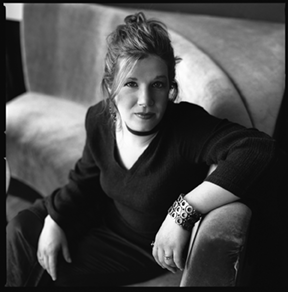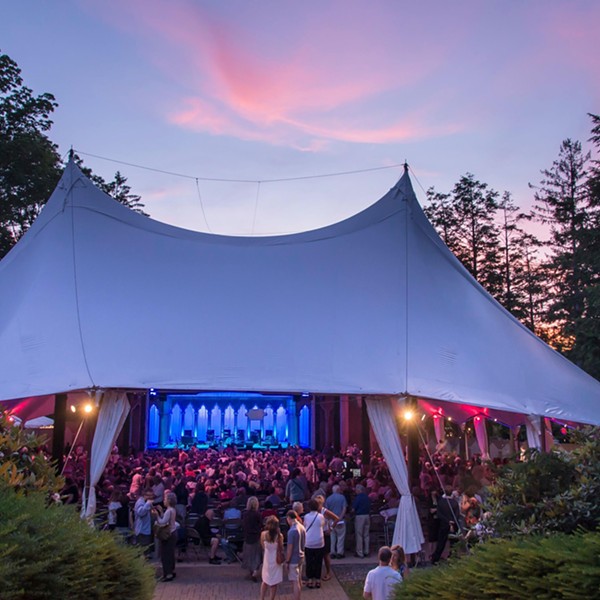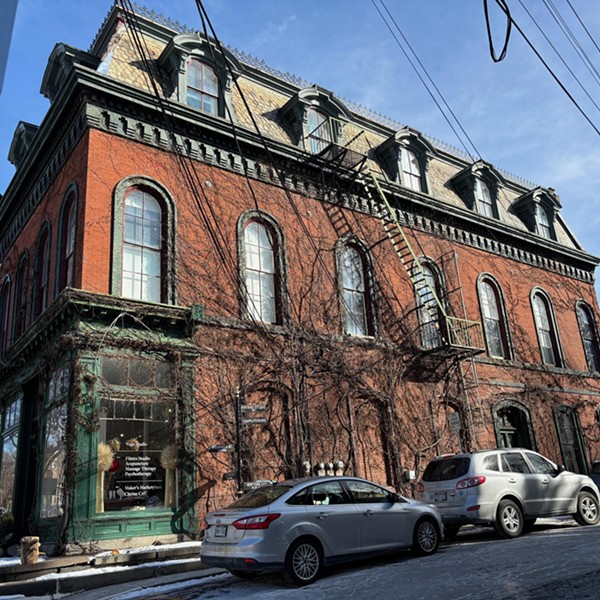Dar Williams arrived in 1994 via her Athena-bursting-from-the-head-of-Zeus debut, The Honesty Room, on which she hit the ground running a line strung between unabashed pop melodicism and breathtakingly deep wordplay. From the start it was quite a show, as the Westchester native deftly wove a rich landscape of characters both observed and inhabited, often in the middle of situations rarely essayed by songwriters; in both the captivating darkness and the breezy humor of Williams’s work, folks wrestle with body image, depression, the complications of connection, and—her stock in trade—the web of family. Over the course of eight acclaimed albums, Williams has made the resulting smorgasbord accessible to a steadily growing fan base via an engaging stage presence, a wide-ranging palette of sonic textures, and the chops of an experienced traveling troubadour.
A lucky handful of that fan base can be seen—and heard singing along—on the recently released DVD Live at Bearsville Theater. Shot last spring at the venerable venue, the 16-song set visits every curve of the songwriter’s 13-year career path, including the previously unreleased manifesto “The Easy Way” and a rousing cover of the Grateful Dead chestnut “Ripple.” Solo raconteur Williams greets us in the first half, and, joined by her ace touring and recording band, a refreshingly raw and rockin’ Williams sees us through the second. When we spoke, she’d just listened to the new Radiohead CD, Amnesia (“It kicked my ass!”), in its entirety at an upstate cafe, and she was heading home to download it.
In support of Live at Bearsville Theater, Williams will alight at the Towne Crier in Pawling on November 4 at 8pm. (845) 855-1300; www.townecrier.com.
In the DVD, you talk about having a “crush” on Woodstock, likening the Bearsville gig to being on a dream date with a soccer player. Had you seen any shows there?
No. I knew it was closely allied with the Bearsville Theater, and everything I’ve done with WDST has been golden. It was a kind of homecoming for me; I lived in Red Hook and I would go over to Woodstock and just walk around and feel it.
I regret my hair [that night]. I meant for it to be as excited as I was, but it was a little taut. It was a little more geisha than I’d hoped for. [Laughs.]
I thought the hair was part of a new chapter in your life; you’re a mom now [Williams has a three-and-a-half year old son] and you’re taking a stand with the Echoes Initiative [Williams’s organization that allows local charities to set up at her gigs]. There’s a shift in your material that’s more socially conscious.
Yes. Still in the music, deeper than ever, but [the hair], may be a little less feral.
The arc of your career has taken place during a massive sea change in how people communicate and how they acquire music. Have you been able to gauge that in your audiences?
I benefited so much from the beginning of the Internet. It was a romantic period where a kid from Omaha could hear Dar Williams on a compilation from Kerrville [Folk Festival] and she could find a chat group; and that person can agitate and find someone in Lincoln and Wichita, and they could get a concert series going at their local cafe. These kids felt heard and understood for the first time. My career had an incredible populist wave.
A lot of things changed after 9/11. There’s a sad cynicism that’s part of the Bush administration that says, “We don’t need the live-music culture, stay home and watch the terror alert.” Even in the Reagan years, there was more of a tendency to get out and be social, certainly with Clinton.
There’s a line in Leonard Cohen’s “Anthem”: “Every heart to love will come / But like a refugee.” When you’re young, you think, “We’ll transform the planet to love.” But then you realize there are so many things that are telling you to stay home and watch TV. There’s a lot to weigh us down now, but I still see people coming out to hear music, almost as refugees. Refugees who have escaped their own living rooms!
Does your band [Mike Visceglia, bass; Ben Butler, guitar; and Steve Holley, drums] have a name?
No.
May I suggest The Handsome Men?
[Laughs.] Especially when I have my friend Julie, who’s a queer percussionist—no one, however they are oriented, looks at me. But, at the same time, the band is always giving the energy back to me. They are all gold. My song “The Mercy of the Fallen” is somewhat inspired by people like my drummer, Steve Holley [Wings, Elton John, Joe Cocker], who has seen it all.
You wrote a beautiful song about parenthood [“The One Who Knows,” featured in Live at Bearsville Theater] before becoming a parent. Does it feel different to play that now that you are a parent?
It does. I use it to check in and make sure all those things are still true, and they are. I don’t know if I could write that song now. I’m glad I wrote it then, because [parenthood] is so busy, so bureaucratic; it’s like being in a field of flowers instead of being able to pick one flower and look at it and describe how amazing it is.

















